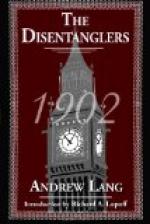‘Haud up, man!’ said the rough, withdrawing the support.
‘A’ freens here,’ remarked Merton, drawing a dirty clay pipe from his pocket. ‘Hae ye a spunk?’
The rough provided him with a match, and he killed some time, while Preston Pans was passed, in filling and lighting his pipe.
‘Ye’re a Lanerick man?’ asked the inquiring rough.
’Ay, a Hamilton frae Moss End. But I’m taking the play. Ma auld tittie has dee’d and left me some siller,’ Merton dragged a handful of dirty notes out of his trousers pocket. ’I’ve been to see the auld Bowers, but Lairdie was on the shift.’
‘And ye’re ganging to Embro?’
‘When we cam’ into Embro
Toon
We were a seemly
sicht to see;
Ma luve was in the—
I dinna mind what ma luve was in—
‘And I ma’sel in cramoisie,’
sang Merton, who had the greatest fear of being asked local questions about Moss End and Motherwell. ‘I dinna ken what cramoisie is, ma’sel’,’ he added. ‘Hae a drink!’
‘Man, ye’re a bonny singer,’ said the rough, who, hitherto, had taken no hand in the conversation.
‘Ma faither was a precentor,’ said Merton, and so, in fact, Mr. Merton pere had, for a short time, been—of Salisbury Cathedral.
They were approaching Portobello, where Merton rushed to the window, thrust half of his body out and indulged in the raucous and meaningless yells of the festive artisan. Thus he tided over a rather prolonged wait, but, when the train moved on, the inquiring rough returned to the charge. He was suspicious, and also was drunk, and obstinate with all the brainless obstinacy of intoxication.
’Aw ‘m sayin’,’ he remarked to Merton, ‘you’re no Lairdie Bower.’
’Hear till the man! Aw ‘m Tammy Hamilton, o’ Moss End in Lanerick. Aw ’m ganging to see ma Jean.
’For day or night
Ma fancy’s flight
Is ever wi’ ma Jean—
Ma bonny, bonny, flat-footed Jean,’
sang Merton, gliding from the strains of Robert Burns into those of Mr. Boothby. ‘Jean’s a Lanerick wumman,’ he added, ’she’s in service in the Pleasance. Aw ‘m ganging to my Jo. Ye’ll a’ hae Jos, billies?’
’Aw ‘m sayin’,’ the intoxicated rough persisted, ’ye’re no a Lanerick man. Ye’re the English gentleman birkie that cam’ to Kirkburn yestreen. Or else ye’re ane o’ the polis’ (police).
‘Me ane o’ the polis! Aw ‘m askin’ the company, div a look like a polisman? Div a look like an English birkie, or ane o’ the gentry?’
The other passengers, decent people, thus appealed to, murmured negatives, and shook their heads. Merton certainly did not resemble a policeman, an Englishman, or a gentleman.
‘Ye see naebody lippens to ye,’ Merton went on. ‘Man, if we were na a’ freens, a wad gie ye a jaud atween yer twa een! But ye’ve been drinking. Tak anither sook!’




